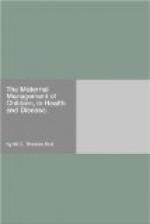The symptoms or signs of the approach of this disease have been ably and graphically depicted by the late Dr. Cheyne,
“In the approach of an attack of croup, which almost always takes place in the evening, probably of a day during which the child has been exposed to the weather, and often after catarrhal symptoms have existed for several days, he may be observed to be excited; in variable spirits; more ready than usual to laugh or to cry; a little flushed; occasionally coughing, the sound of the cough being rough, like that which attends the catarrhal stage of the measles. More generally, however, the patient has been for some time in bed and asleep before the nature of the disease with which he is threatened is apparent; then, perhaps without awaking, he gives a very unusual cough, well known to any one who has witnessed an attack of the croup: it rings as if the child had coughed through a brazen trumpet; it is truly a tussis clangosa; it penetrates the walls and floors of the apartment, and startles the experienced mother—’Oh, I am afraid our child is taking the croup!’ She runs to the nursery, finds her child sleeping softly, and hopes she may be mistaken. But remaining to tend him, before long the ringing cough, a single cough, is repeated again and again. The patient is roused, and then a new symptom is remarked: the sound of his voice is changed; puling, and as if the throat were swelled, it corresponds with the cough; the cough is succeeded by a sonorous inspiration, not unlike the kink in hooping-cough—a crowing noise, not so shrill, but similar to the sound emitted by a chicken in the pip (which in some parts of Scotland is called the roup, hence probably the word croup); the breathing, hitherto inaudible and natural, now becomes audible, and a little slower than common, as if the breath were forced through a narrow tube; and this is more remarkable as the disease advances,” etc. etc.
It is unnecessary for me to add to the foregoing picture.
Maternal management.—Having early obtained medical assistance attend with the strictest obedience to the directions given. And in this disease, more than any other, it is particularly important that the mother should give her personal superintendence; for the activity of the progress of the disease leaves no time to retrieve errors or atone for neglect. The practitioner may be prompt and decided in the measures he prescribes, but they will avail little, unless they are as promptly and decidedly acted upon.
The parent will have her reward; for, if timely aid has been afforded, and adequate means used, the event will be almost invariably favourable.
Its prevention.—Croup, when it has once attacked a child, is very liable to recur at any period before the thirteenth or fourteenth year of age. It may even do so several times, and after intervals of various duration. It is very desirable, therefore, that a parent should be acquainted with the means of prevention.




